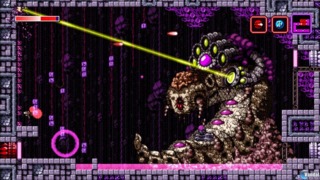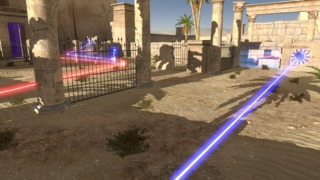Monthly Roundup, April 2015
By majormitch 6 Comments
Well, I’ve made it. After the busiest year of my life I have a brand new master’s degree, which is honestly a little bittersweet at the moment; for as busy and difficult as the year was, I know I’m going to miss it. Otherwise I have a whole month off before I start my next job, and I’m pretty excited to use that time to rest and catch up on some video games I’ve fallen behind on. Before I get to that, however, it’s time to round up the games I did manage to get to during my final month of school. It turned out to be a mostly low-key month, at least compared to the rest of the year, and I had some solid gaming time. I think I used it to good effect too, and played some pretty darn good games. Let’s get to it!
Axiom Verge
I’ve been eagerly awaiting Axiom Verge since I first saw it in motion, albeit with a cautious optimism. Metroid is one of my favorite franchises after all, and given Nintendo’s current (and lengthy) neglect of the franchise, it’s been left to others to try to recreate what it has done so well in the past. While a scant few have gotten close (Shadow Complex being perhaps the best example), no one else has really captured that Metroid spirit. I still cringe whenever the term “Metroidvania” is used, because, as mentioned last month, it’s a poor word that has essentially lost all meaning. We throw it around freely to describe games that barely feel like Metroid and/or Castlevania (two series that in themselves aren’t all that alike), and trying to describe an entire “subgenre” with a portmanteau of two very specific games simply doesn’t hold up; imagine if we described all 2D platformers as “Mariosonics” or something. Yet we keep doing it, with Axiom Verge being the latest game to fall into that trap.
Hence the skepticism; it always feels like that often inaccurate term is meant to be nostalgia bait more than anything. But something about Axiom Verge seemed genuinely intriguing, so I held out hope that it would pan out regardless of how much it deserved its dumb label. Fortunately, it is interesting. Very interesting. And lo and behold, it also happens to be the most “Metroid” of any game I’ve tried that’s not actually Metroid; it well surpasses Shadow Complex for that title. You have a large, intricately designed, and mysterious alien world to explore, one that hides a rich history. You acquire a host of weapons and upgrades throughout your journey, and each one adds substantial functionality to your ever expanding repertoire. You fight larger than life bosses, search every nook and cranny for hidden secrets, and are accompanied by some fantastic visuals and a killer soundtrack while you’re at it. It checks all the boxes I want, but none more so than that exploration element. For a game of this style to work, I feel it really has to nail the exploration above all else. Metroid never had best in class combat or platforming or anything; it succeeded by giving you an incredibly well designed world to explore. Most importantly, it gave you compelling reasons to explore that world. Axiom Verge does this extremely well, matching the classics. There’s just a lot of variety from start to finish, which is apparent in the visual style of the areas, the enemies and bosses, the environmental puzzles, and the useful abilities you’re constantly picking up. All of this makes it exciting to round the next corner, as there’s always a high potential for something new, both in terms of gameplay and aesthetics. Exploring Axiom Verge’s dirty sci-fi world is constantly enticing, and easily the best part of the game.

That’s not to say the rest of the game is a slouch. The combat is at least as solid as it is in any Metroid game, and its variety of guns may make it better. The story is also something I found uniquely interesting, and the audiovisual presentation is top notch; I can’t stop listening to its soundtrack. Every piece of the game comes together beautifully to produce an experience that I was consistently eager to push forward. I didn’t put it down until I had meticulously explored every corner many times over, squeezing every last drop out of it I could. I’m still ready for more too, and will likely dive back in someday. Finally, for as much as Axiom Verge successfully replicates what Metroid has done so well, it subverts those tropes just as frequently. In particular, the abilities you acquire function and combine in unique ways that I never could have predicted. Many of my favorite moments in the game came from realizing how two seemingly unrelated abilities combined to increase my mobility in profound ways. These moments were incredibly exciting, filling my imagination with all sorts of new possibilities, and sparked lengthy expeditions. The way the game hides items also requires a fresh logic that’s more nuanced than your typical “lock and key” situation. I won’t spoil anything, but there’s a lot of subtle information conveyed within the world, its creatures, and their language; it’s worth paying attention to even the tiniest of details. Many of these items aren’t required at all either, and the order you can obtain them is much more dynamic than similar games. Axiom Verge also has some incredibly smart boss designs, and they’re often susceptible to different weapons. I imagine your strategy for some bosses could vary wildly depending on which weapons you’ve acquired, and it’s cool to see such a dynamic structure in a type of game that typically relies on certain items for certain bosses.
All of this to say, I really, really like Axiom Verge. In many ways it takes the essence of the best Metroid games, and then spins off into an alternate timeline to create something that is very much its own thing. It looks great, sounds even better, and is a joy to play every step of the way. In particular, its world is extremely well designed, and I eagerly explored its countless hallways until I had left no stone unturned. It’s a surprisingly fresh take on a style of game I’ve always held dear, and it certainly doesn’t need that “Metroidvania” label to stand out. Axiom Verge is an awesome game, plain and simple, and while this type of game isn’t for everyone, I’d have a hard time not recommending it in any circumstance.
The Talos Principle

Almost every year there’s at least one game I don’t get around to playing by year’s end that should have ended up on my top 10 list. This is now the case for 2014, thanks to The Talos Principle. It simply came out too late to make my 2014 top 10, but I feel pretty confident in saying it would have had I played it. This is a class act puzzle game from start to finish, combining surprisingly intricate puzzle design with a world and mythos that ends up being pretty fascinating by the end. It was the puzzles that grabbed me at first though. Like Portal and Antichamber before it, The Talos Principle is a first person puzzle game that relies on a few seemingly simple mechanics that end up proving to be very robust. It’s able to combine and permute its ideas in different, interesting ways, introducing new layers of complexity with each one. This leads to a series of puzzles that feel like they continually ramp up without having to introduce new mechanics; it’s a perfect example of a game getting a lot of mileage out of a few good ideas. For the game’s opening hours I was hooked, and wanted to see what new logic the next puzzle introduced. I learned to move boxes, place jammers, and redirect light beams in all sorts of clever ways, and only rarely did I encounter a solution that was even slightly frustrating. The puzzles in The Talos Principle are as rewarding as just about anything out there. Only the game’s length dragged them down for me, as I felt it bogged down towards the end ever so slightly. Still, it’s a very minor complaint of what’s otherwise a stellar suite of puzzles.
Given the caliber of its puzzles, The Talos Principle would be a great game if that’s all it was, but it layers in a story that’s almost as interesting on its own merits. I wasn’t sold on it at first, however, as it begins with some pretty stereotypical philosophical musings, such as the definition of humanity, the nature of free will, or the role of religion. These story bits occur via computer terminals scattered in each level that you scroll through and read, and I initially found this process to be a distracting hindrance to the exquisite puzzles. As the game went on, however, and the puzzles started to bog down, the text within these terminals lifted the game with a broader subtext. While the esoteric musings still never did much for me, I grew more curious about the true nature of what was really happening with these puzzle chambers. You start to uncover details about how all of this became constructed, and while the multiple endings were fairly obvious, I thought they were very well done nonetheless. The ending I got was really cool, and was accompanied by a fairly impactful final sequence. So in the end I appreciated the game’s story component, and when combined with the puzzles it makes for a game that’s engaging on multiple levels. The Talos Principle is a game that will make you think in a myriad of ways if nothing else, making it a game worth checking out for anyone who isn’t opposed to doing so.
The Other Stuff
- Some friends and I spent a few hours with The Jackbox Party Pack, which marks the first time I’ve played any of the games contained within. Though if I’m being honest, we mostly just played Fibbage, which is easily the standout of the pack. It’s a hilarious and entertaining way to spend time with a group of people who aren’t comfortable with a controller in their hands, and it all works because the questions posed are just odd enough to allow the players to devise all sorts of lies that are just believable enough. I can easily see myself playing more Fibbage in the future.

- I spent a surprisingly hefty chunk of time on Cook, Serve, Delicious! last month, which turned out to be way more addictive than I expected. There’s something mesmerizing about putting together customer orders under strict time pressure; think about applying something like Papers, Please’s document checking dynamic to a fast paced restaurant. On top of that, there’s an interesting metagame where you upgrade your restaurant itself. It’s all quite fascinating, with the only downside being that it sadly and needlessly feels drawn out and repetitive. I played a few hours and got a little past a one star restaurant, and I’m not sure if I will go back. But I really like what I played.
- At long last, I finally got around to playing through Monument Valley in April. Seeing as the game is under two hours long, it really shouldn’t have taken me this long to play it, but here we are. Fortunately I enjoyed it though, even if it was a bit simple in the end. I feel like there was room to push those ideas further, but the core concept is still interesting and strong enough to be worth it. Plus, the game looks and sounds really cool. It’s a neat thing.
- Despite genuinely liking the Wii (seemingly one of the few), I had never gotten around to trying one of its rare lauded WiiWare franchises, LostWinds. Correcting that had been in the back of my mind for some time, and I finally played a few hours of LostWinds: Winter of the Melodias last month. As these things can often go, I ended up not liking it that much. The way you push your character around via the Wii remote was a frustrating hindrance more often than I felt it should have been, and the game’s environmental puzzles were too shallow to be that engaging. I enjoyed the charming presentation, but otherwise I didn’t find much that grabbed me in LostWinds, which was a bit of a bummer.
Looking Ahead to May
As mentioned up top, for the first time in a long time I have a genuine gaming month ahead of me in May, which I plan to use to its fullest. I sunk quite a few hours into Bloodborne over the past two weeks, which will remain my primary focus for the time being. I’ve also started Broken Age, and I will have things to say about both those games in the future. The next “big” game I really want to get to this month is The Evil Within, which seems doable, and I’ll pepper the month with some as-yet-to-be-determined backlog games as well. We’ll have to see where I am after that, and if I make quick progress I may even do a “mid-month roundup”. Finally, there are a few interesting games coming out in May: Wolfenstein: The Old Blood, The Witcher 3: Wild Hunt, Splatoon, and Galactic Civilizations III are all scheduled for release this month. I’m not totally sold on any of those yet, but they’ve all caught my eye. Regardless of what games I manage to get to, I expect May to be a pretty serious gaming month. It’s been a long time since I’ve said that, and it feels pretty good :)
